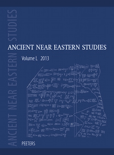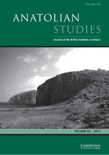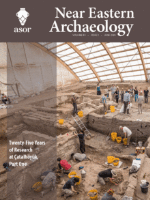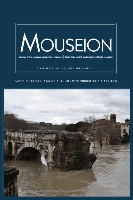
Opuscula-Annual of the Swedish Institutes at Athens and Rome
Scope & Guideline
Bridging Past and Present Through Cutting-Edge Scholarship
Introduction
Aims and Scopes
- Ancient Mediterranean Archaeology:
Focuses on archaeological findings and methodologies that illuminate life in ancient Mediterranean societies, including urban and rural environments. - Cultural Heritage Preservation:
Engages with contemporary issues surrounding the preservation of cultural heritage, particularly in conflict zones, as evidenced by recent papers addressing the Syrian cultural heritage crisis. - Historical and Epigraphical Studies:
Explores historical documents and inscriptions to provide insights into political, social, and cultural dynamics of ancient civilizations. - Interdisciplinary Approaches:
Encourages interdisciplinary methodologies, combining archaeology with bioarchaeology, anthropology, and environmental studies to gain holistic insights into ancient life. - Gender Studies in Antiquity:
Investigates gender roles and representations in ancient societies, highlighting new voices and perspectives in the study of gender in contexts such as Rome.
Trending and Emerging
- Bioarchaeology and Human Remains:
There is a growing emphasis on bioarchaeological studies, providing insights into health, diet, and social practices of ancient populations, as evidenced by papers discussing necropolises and human remains. - Technological Innovations in Archaeology:
The use of high-tech applications and methodologies in archaeological research is on the rise, with recent studies utilizing advanced techniques for excavation and analysis. - Environmental and Urban Studies:
Research exploring human-environment dynamics and urban water management in ancient societies is becoming increasingly relevant, reflecting a broader interest in sustainability and urbanism. - Gender and Identity Studies:
Emerging scholarship on gender and identity in ancient Rome and other contexts is gaining traction, indicating a shift towards inclusive narratives that challenge traditional perspectives. - Cultural Exchange and Interaction:
There is an increasing focus on cultural exchange and interactions among ancient societies, particularly in the context of trade, migration, and the spread of ideas, as highlighted in recent publications.
Declining or Waning
- Traditional Art Historical Studies:
While art history remains important, there has been a noticeable reduction in papers solely focusing on stylistic analyses of artifacts, as the field moves towards more contextual and interdisciplinary approaches. - Mythological Studies:
There is a waning interest in purely mythological interpretations without archaeological or historical grounding, as scholars increasingly seek empirical evidence to support their analyses. - Narrow Regional Studies:
Papers focusing exclusively on localized studies without broader Mediterranean or comparative contexts are less frequent, indicating a shift towards more integrative research that connects various regions.
Similar Journals

Studia Historica-Historia Antigua
Bridging Eras: Where Ancient Meets ContemporaryStudia Historica-Historia Antigua is a distinguished Open Access journal published by EDICIONES UNIV SALAMANCA, dedicated to the advancement of research in the field of ancient history. With a solid foundation since its inception in 1983, this journal has maintained its commitment to accessibility and knowledge dissemination, reaching a wider audience in Spain and beyond. ISSN: 0213-2052 and E-ISSN: 2530-4100 enable seamless engagement with its scholarly content. Ranked in the second quartile (Q2) in the History category in 2023 and occupying the 903rd position out of 1,760 in the Scopus ranking for Arts and Humanities, the journal underscores its relevant position in the academic landscape. Its converged years from 2017 to 2024 highlight ongoing scholarly dialogue while facilitating the exploration of diverse perspectives in ancient history. This journal serves as a vital resource for researchers, professionals, and students aiming to deepen their understanding of historical narratives and methodologies. Located in Salamanca, Spain, Studia Historica-Historia Antigua is not only a platform for rigorous academic discourse but also a contributor to the collective pursuit of historical insights in the evolving field of history.

OLBA
Connecting Scholars to the Legacy of the PastOLBA is a distinguished journal in the field of archaeology, published by Mersin University Publications Research Center Cilician Archaeology in Turkey. With an ISSN of 1301-7667, this academic journal has been a platform for scholarly discourse from 2009 to 2014 and again from 2016 to 2019, with a recent volume published in 2022. Although it is currently categorized in the fourth quartile (Q4) for both Arts and Humanities and Social Sciences within archaeology, OLBA continues to contribute significantly to the global archaeology community. It serves as an essential resource for researchers, professionals, and students interested in the diverse aspects of archaeological studies and cultural heritage. Despite not being an open-access journal, OLBA strives to disseminate knowledge effectively, aiding in the exploration of ancient civilizations and the rich tapestry of human history. Its Scopus rankings, placing it in the bottom percentiles, demonstrate the ongoing need for the community to support and engage with the journal to enhance its visibility and impact in the archaeological domain.

Cartagine-Studi e Ricerche
Bridging disciplines to enrich the study of the past.Cartagine-Studi e Ricerche is a distinguished academic journal published by UNIV STUDI CAGLIARI, dedicated to advancing the fields of Archaeology, Classics, and History. With an Open Access format since its inception in 2016, this journal ensures that scholarly research is freely available to a global audience, fostering knowledge dissemination and collaboration among researchers, professionals, and students. Based in Italy, it occupies a vital place in the academic community, holding a Q3 ranking in each of its categories for 2023, showcasing its relevance and impact in the disciplines it covers. Scopus rankings further validate its quality, with impressive percentiles reflecting its significant contributions to the landscape of arts and humanities. Spanning converged years from 2019 to 2024, Cartagine-Studi e Ricerche serves as a crucial resource for those engaged in the study of ancient cultures and historical contexts, inviting innovative research and critical discussions that shape our understanding of the past.

Ancient Near Eastern Studies
Advancing Scholarship in the Heart of Ancient HistoryAncient Near Eastern Studies, published by PEETERS in Belgium, is a distinguished journal dedicated to the exploration and scholarship of the rich cultural and historical tapestry of the ancient Near East. With a focus on interdisciplinary research, this journal invites contributions across various fields including Archeology, History, Classics, Literature and Literary Theory, and Visual Arts and Performing Arts. As evidenced by its robust performance in the 2023 category quartiles, ranking Q1 in Classics and Q2 in History, this journal is recognized for its academic rigor and relevance, making it an integral platform for researchers, professionals, and students alike. Although currently not open access, it provides indispensable insights into research trends and theoretical frameworks that advance our understanding of ancient civilizations. With its ISSN 1378-4641 and E-ISSN 1783-1326, Ancient Near Eastern Studies continues to foster scholarly communication and engagement in this vital area of human history.

LATOMUS
Advancing Knowledge in Classics and BeyondLATOMUS is a distinguished academic journal published by Peeters in Belgium, offering a rich platform for scholarly discourse in the fields of Classics, Archaeology, History, Literature, and Linguistics. With the ISSN 0023-8856 and E-ISSN 2294-4427, it has established itself as an essential resource for researchers and professionals seeking to contribute to and engage with critical debates within these disciplines. While not an Open Access journal, LATOMUS is recognized for its robust impact in the academic community, achieving Q2 and Q3 rankings across various categories, including Classics and Archaeology, according to the latest 2023 evaluations. The journal publishes articles that span a range of topics relevant to antiquity and its influences, making it a vital resource for those exploring historical narratives and linguistic developments. As a publication dedicated to advancing scholarly knowledge since its inception in 1971, LATOMUS continues to serve as a cornerstone of academic inquiry within the humanities, promoting intellectual engagement and disseminating high-quality research in its converged years from 1971 to 1974, 1980, and from 2002 to the present.

Acta Classica
Illuminating the Classics for Contemporary UnderstandingActa Classica is a distinguished journal dedicated to the field of Classics, published by the Department of English in Classical Languages at the University of Free State, South Africa. With its ISSN 0065-1141 and E-ISSN 2227-538X, this journal has been a pivotal platform for scholarly discourse since its inception in 1973, notably converging and evolving significantly in its content from 2010 to 2023. Although it currently holds a Q4 classification in Classics, its Scopus ranking at #88 out of 170 in the Arts and Humanities reflects its relevance in academic circles, with a 47th percentile standing. The journal aims to publish high-quality research articles, reviews, and critical essays that not only explore the rich tapestry of ancient civilizations but also contribute to contemporary understandings of classical languages and literature. While its content is not openly accessible, Acta Classica remains an essential resource for researchers, professionals, and students who seek to deepen their knowledge and engagement with Classical studies.

Adalya
Advancing Knowledge in Archaeology and Cultural PreservationAdalya, published by the esteemed Koc University Suna & Inan Kirac Research Center for Mediterranean Civilizations (AKMED), is a prominent academic journal dedicated to the fields of Archeology, History, and Conservation. With an ISSN of 1301-2746, this journal serves as an essential platform for scholars and researchers, fostering insightful discussions and disseminating significant findings about Mediterranean civilizations. Recognized in the quartile rankings of Q3 in Archeology and Q2 in both Conservation and History for the year 2023, Adalya reflects an impactful presence in its respective disciplines. Although it operates under a traditional subscription model, the journal remains accessible to a diverse audience interested in the nuanced exploration of historical contexts and conservation practices. Located in Antalya, Turkey, the journal has carved out a niche since its inception in 2009, bridging the past and present through rigorous academic inquiry. Whether you are a seasoned researcher or a student eager to deepen your understanding of Mediterranean cultures, Adalya offers invaluable resources and perspectives that enrich the academic community.

Anatolian Studies
Connecting Past and Present Through Scholarly InquiryAnatolian Studies, published by Cambridge University Press, stands as a premier forum for research in the fields of archaeology, cultural studies, and history. Established in 1951, this esteemed journal has consistently contributed to the academic discourse surrounding the rich and multifaceted history of Anatolia, earning its place in the Q1 category across multiple disciplines. With a notable impact factor reflected in its Scopus rankings, it ranks among the top journals in its fields: 78th in History, 155th in Cultural Studies, and 55th in Archaeology, showcasing its significant influence and recognition. This journal serves as an invaluable resource for researchers and scholars seeking to delve into the intricacies of Anatolian heritage, providing a platform for innovative research and critical discussion within the academic community. While it currently does not offer open access, Anatolian Studies continues to enrich scholarly resources and advance knowledge within its key areas of focus.

NEAR EASTERN ARCHAEOLOGY
Bridging Past and Present Through Archaeological InquiryNEAR EASTERN ARCHAEOLOGY, published by University of Chicago Press, is a premier journal dedicated to the field of archaeology, particularly focusing on the rich cultural heritage and archaeological findings of the Near East. With an ISSN of 1094-2076 and an E-ISSN of 2325-5404, this esteemed publication provides a vital platform for scholars and practitioners to share their research, insights, and discoveries. The journal holds an impressive ranking in the Q1 quartile for both Archaeology and History in 2023, reflecting its significant impact within these fields and a robust history of scholarly contribution. The journal has been pivotal in shaping discussions around archaeological methodology, theory, and contemporary issues from 2002 to 2024, as it continues to reach a wide audience through various access options. With Scopus rankings placing it in the top percentiles for both History and Archaeology, NEAR EASTERN ARCHAEOLOGY represents an essential resource for researchers, professionals, and students alike, fostering the exploration and understanding of the region's archaeological narrative.

Mouseion-Journal of the Classical Association of Canada
Exploring the legacies of ancient cultures.Mouseion - Journal of the Classical Association of Canada, published by University of Toronto Press Inc, stands as a vital academic resource in the fields of Classics and Archaeology. With a focus on promoting scholarly discourse, this journal provides a platform for original research, critical reviews, and interdisciplinary studies that engage with ancient cultures and their legacies. Since its convergence in 2019, Mouseion has quickly established itself within the academic community, achieving a commendable Q1 ranking in Classics and Q2 in both Archaeology categories in 2023, showcasing its commitment to excellence. While not an open-access journal, it is positioned among the top 29% of classics journals, reflecting its impact and the quality of publications. Nestled within Canada, this journal addresses a global audience of researchers, professionals, and students dedicated to the exploration of the classical world, and it endeavors to contribute significantly to the scholarly understanding of cultural heritage.